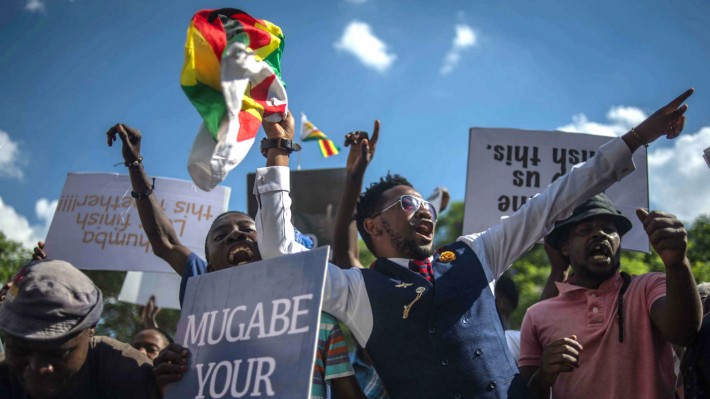
Robert Mugabe’s 37-year rule as president of Zimbabwe came to an end last night, one week after a coup was launched to replace him.
MPs roared in jubilation as Jacob Mudenda, speaker of the Zimbabwean parliament, read out Mugabe’s resignation letter. The announcement halted an impeachment hearing against the 93-year-old president, who had repeatedly refused to step down even after he was sacked as leader of his Zanu-PF party.
News of his resignation quickly spread onto the streets of the capital Harare, where hundreds of thousands of people united to celebrate Mugabe’s downfall, something which would have been unthinkable just a month ago.
Mugabe insisted the decision to resign was voluntary and made to allow a smooth transition of power, although he did not mention who would take over from him.
The constitution says it should be the current vice-president. But Phelekezela Mphoko is a supporter of Mugabe’s wife Grace, who is now under house arrest and facing prosecution, and Reuters says former vice president Emmerson Mnangagwa, whose sacking triggered the coup, is expected to be the person sworn in as president next Wednesday.
In September, the news agency reported that Mnangagwa was plotting to succeed Mugabe with the backing of the army. The hope was that Mnangagwa would have headed an interim unity government with the blessing of the international community, allowing Zimbabwe to end decades of isolation from global lenders and donors.
The international community has been supportive of the military takeover and the army itself has been “at pains to insist it was not a coup at all”. There have quite deliberately been no street curfews, no violent crackdowns and no appointment of a military junta to take control of the levers of power, says CNN.
World leaders last night lined up to endorse the takeover. Theresa May said Mugabe’s departure “provides Zimbabwe with an opportunity to forge a new path free of the oppression that characterised his rule”.
Yet Mugabe’s sudden downfall was caused by rivalry between members of Zimbabwe’s ruling elite over who would succeed him, “rather than popular protests against his rule”, claims The Daily Telegraph.
This has led some to fear that Mugabe’s fall will not mark a new chapter in Zimbabwe’s history but merely a continuation of authoritarian rule under a different figure.
Mnangagwa’s statements over the past week, calling for Mugabe to “take heed of the clarion call by the people”, as well as his continued absence, “appeared to be part of an effort by his allies to distance him from the military intervention and to portray it as a reflection of the popular will”, says The New York Times.
China has denied speculation it had a hand in efforts to dethrone Mugabe, saying such claims are an “evil” plot designed to sully its reputation and derail China-Africa relations.
“A recent visit to Beijing by one of the architects of last week’s slow-burn coup has stoked suspicions China played some role in attempts to oust its longtime ally,” with experts saying Mugabe had fallen out of favour with China’s Communist party leaders in recent years, reports The Guardian.
At least a “semblance of legitimacy, especially for a government under Mnangagwa, who is known as the enforcer of some of Mugabe’s most ruthless policies, will be critical in gaining recognition from regional powers, Western governments and international lenders”, says The Times.
Read Why Nigerian States Boycotted FAAC Meeting
The 36 states in Nigeria on Thursday boycotted the monthly Federal Account Allocation Committee (FAAC) meeting due to discrepancies in figures presented by the Federal Government.
The Chairman, Forum of Finance Commissioners in Nigeria, Mr Mahmoud Yunusa, said the forum came to the decision after consultation with their state governors.
According to him, the governors have given the commissioners directive to postpone the meeting pending the reconciliation of all accounts.
“The meeting has been postponed until we reconcile the figures in the accounts.
“I sincerely apologise for keeping everyone, but this is the position of our principals through the Chairman, Governor’s Forum, even though the matter was discussed at length during NEC when all the Governors were present.
“So we should all take our leave and wait for the next date which will be announced later,” he said.
Yunusa said that the finance commissioners as well as the state Accountants-General would meet next week to decide when to reconvene the meeting.
The News Agency of Nigeria (NAN) later approached the Chairman, who is also the Adamawa state Commissioner for Finance.
He refused to expatiate on the nature of the discrepancies.
However, another Commisioner, on condition of anonymity, told NAN that the discrepancies came from the figures presented by the Nigerian National Petroleum Corporation.
The latest development is coming four months after the NNPC completed the refund of N450 billion to the federation account, to be shared to federal, states and local councils.
The NNPC had for 67 consecutive months, paid an additional N6.33 billion into the federation account to be shared to federal, states and local governments.
The payment, which started in September 2011, was due to an audit, which showed that the NNPC had been under remitting revenue into the Federation Account.
